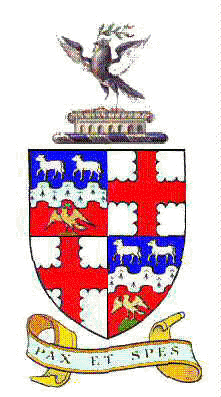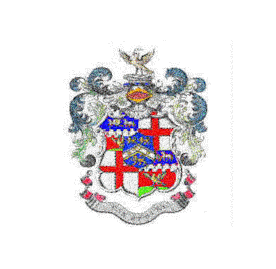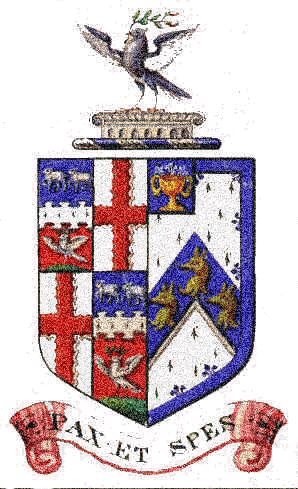



The Pease Family of Darlington, County Durham
Hutton Lowcross & Pinchinthorpe, Co. Yorks.
Allied Families & Quaker Associations




Examples of Pease (Hutton Lowcross & Pinchinthorpe) Coats of Arms
The Pease branch to which I belong, finds its later origin in the removal of Edward Pease, (1711-1785), son of Joseph Pease, (1665-1719), from Pease Hall, Shafton, to Darlington, County Durham. There he entered the wool combing business of his uncle, Thomas Coldwell, which in 1760, he took over, when his uncle retired. Edward expanded the wool combing business, such that it incorporated the processes of weaving and dyeing. In due course, the business was passed to his son Joseph (1737-1808), who expanded the business further and established a small banking business called Pease Partners Bank. The banking arm of the business was to allow further expansions, a habit that was not unknown amongst Quaker businessmen and further, by marrying into other Quaker families, the means to extend interests was increased many fold. Joseph, by his marriage to Mary Richardson produced a son Edward (1767-1858), (Edward married Rachel Whitwell), who continuing the traditions of the business, expanded into railways. Whilst to the informed, the name Edward Pease will always be associated with the beginnings of the Stockton and Darlington Railway, it is to George Stephenson that most of the associations are credited. There is no doubt that Stephenson's engineering brilliance provided the ways of establishing the world's first passenger railway, but there is no argument that without the meeting between Edward and George in April of 1821, and Edward's persistent advocacy of the means by which it could be accomplished, the railway would not have been built at all. Thus it was that he became known as 'The Father of Railways'. The mantle of the family businesses was then to pass to Edward's son Joseph (1799-1872), who expanded, with his brothers into the colliery business, iron ore mining, limestone quarrying, railway locomotive construction, iron foundries, banking and textiles, and made the transition from private life into public politics, to become the first Quaker to be elected to Parliament. He was MP for South Durham during the course of four Parliaments, during the years 1832-1841. He was a founder of the Middlesbrough Estate in 1829 and a fervent supporter of his father in promoting the railway interests of the family. The entry into politics set a precedent for the family to follow in the next two generations. Indeed in the latter part of the 19th century, no less that 7 members of the immediate Pease family were to sit as Members of Parliament, along with at least another 36 who were linked by marriage and four were raised to the House of Lords, (Gainford, Beaumont, Daryngton & Wardington). Joseph married into the Gurney family of Norwich ( He married Emma Gurney)and amongst his children Joseph Whitwell Pease, the eldest child and my Great-grandfather, (1828-1903), continued the business tradition of his father. He married into the Fox family of Falmouth, (He married Mary Fox), yet another Quaker dynasty and continued to maintain the tradition of a politically active Quaker industrialist. Before the close of his life, he was twice approached for accepting elevation to the Peerage, but refused on both occasions. He did however accept a baronetcy in 1882 from Gladstone. Alas, tragedy was on the horizon and by 1903, owing to a combination of poor trade, depressed markets, the failure of the family bank in the previous year and a prolonged and bitter inter-family row with the Earl of Portsmouth, (Newton Wallop) and his wife, (Beatrice Pease, Joseph's niece), the family fortunes totally collapsed, leaving Joseph Whitwell an unhappy and broken man. The story of course continues from that point, but for the moment, I shall go no further.
If it holds any interest, or should your curiosity
get the better of you, here is a link to by own line. Click
here to continue.